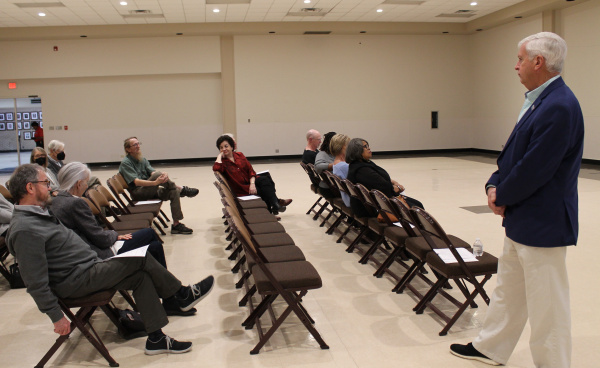Walker: Budget, staff cuts possible if alcohol Prop. 5 fails

Leader photo by Nancy Bergeron Ruston Mayor Ronny Walker, standing, addresses part of the crowd at Thursday's town hall meeting about the upcoming referendum on alcohol sales.
If Ruston voters fail to re-up the proposition on the March 25 local-option referendum ballot that allows restaurants to sell both low- and high-content alcoholic beverages, the city will be forced to cut $4.8 million from its operating budget, impose massive layoffs of municipal employees, and services to residents will suffer.
That’s what Mayor Ronny Walker told about 40 people gathered at a Town Hall meeting Thursday night called to discuss the upcoming vote.
Walker urged city voters to support propositions on the ballot that leave restaurant sales in place, continue to allow retail sales of package beer, and beer-only bars. He also called for passage of a proposition allowing grocery stores sell high-content package alcohol.
But he asked voters to defeat a proposition allowing stand-alone bars.
However, the mayor said he remains comfortable with his previous stand advising voters to approve all five options because the Board of Aldermen has adopted safety net ordinances that should protect the city from package liquor stores and a proliferation of bars.
“It doesn’t matter if you like Ronny Walker or not, but we all love Ruston and we have worked our butts off … to be ready,” he said.
Walker also said nobody knows what the economic impact of allowing grocery stores to sell a full range of alcohol products might be, but he estimates Ruston stands to gain around $1.5 million in new sales tax revenue.
“We feel very comfortable with the $1.5 million,” Walker said.
Though the crux of the referendum is whether grocery stores should be able to sell high- and low-content package alcohol, state law requires that when any one of the five propositions is brought to public vote via petition, all of other have to be voted on, too.
Proposition 1 allows beer sales in stores. Proposition 2 allows beer-only bars. Both are now allowed in Ruston.
Proposition 3 would allow bars not attached to restaurants. Proposition 4 expands grocery store sales. Neither of those are currently legal in Ruston.
Proposition 5 is the restaurant question, and the one Walker said prompted him to get involved with the referendum being pushed by Walmart and Brookshire’s.
The two corporations want to be able to sell high-content alcohol.
“Let me remind y’all of one thing: I’m not the one that brought this,” Walker said.
“But you support it,” said Butch Hightower, who owns a full-line liquor store just over the city limits in Grambling.
Walker was one of the first people to sign the petition that set eventually set the referendum in motion.
He said he did so because he believes residents should have the right to what they want.
“I feel like it’s the right of the people of Ruston to make the decision,” he said.
Walker told meeting-goers it’s his fear that the restaurant proposition could fail.
“That’s the reason I threw myself right in the middle of this,” he said. “You’ll see massive, massive layoffs if (Proposition) 5 fails The city of Ruston has more to lose than anybody in this room if 5 fails.”
Plus, at least six existing restaurants will close, Walker said.
So far, voters who have spoken out favor keeping what’s already in place. It’s the bar and grocery options that are drawing opposition.
Walker said a newly adopted city ordinance requiring roughly a quarter-mile in each direction between bars means at most only four bars could locate in the entertainment district where they’ll be allowed.
“I don’t think one will open because of the economics of it,” he said.
He said competition would be too strong from the 19 Ruston restaurants that already have bars.
Ben Humphries, spokesman for a group calling itself Keep Ruston Ruston, said the group of mostly small business owners “just wants the right information out there,” especially regarding economic impact.
Figures from Walker and Keep Ruston Ruston differ concerning how much new revenue expanded sales might generate.
But both Walker and Humphries agree nobody knows how to accurately calculate the potential impact because existing alcohol sales figures aren’t available.
That’s given way to a swath of numbers, some from an economist retained by the consultant running the referendum campaign for Walmart and Brookshire’s, some borrowed from the city of Pineville’s experience, and Walker’s own calculations.

